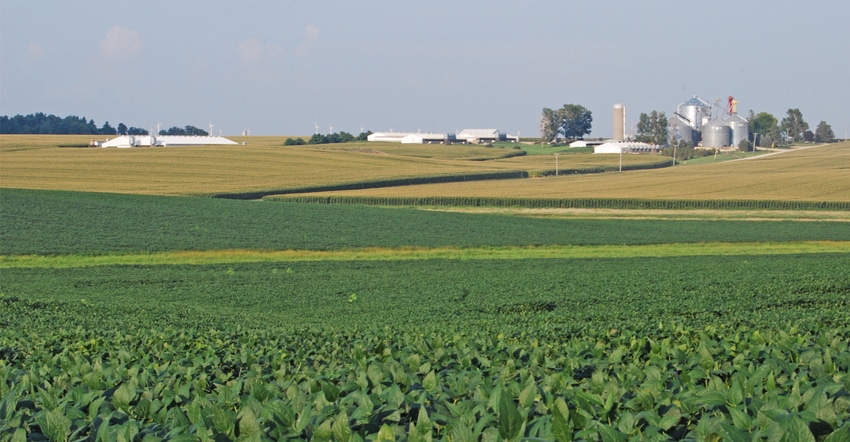August 17, 2020

As we are in the early days of the farm leasing season, it’s a good time to follow up with our readers on issues facing both landowners and tenants.
Recently I had the opportunity to participate in a webinar presented by People’s Co., titled “Farm leasing amidst COVID-19.” In this column, I’ll discuss questions from listeners and thoughts raised by the presenters, including myself, especially given the variables 2020 has thrown at farming operations.
These variables include the onset of COVID-19, the upcoming elections and current political climate, trade policy and a continued economic downturn, and, as always, the weather. Many Iowa farmers were dealt a heavy blow with the damaging windstorms on Aug.10, throwing storm damage into the mix of variables this year.
Variability in farming
Despite the uncertainty of 2020, the law regarding leasing farmland has remained steady. To deal with the variability in farming and the challenges we face, we need to protect ourselves from a legal standpoint. Due to the changing landscape in farming, landlords and tenants may want to revisit the structure of their lease. As always, one of the most important considerations is to put the terms of the lease into written form — even in the most amicable of situations.
The most common form of farm lease still appears to be a fixed cash rent lease. However, the flexible cash lease is growing in popularity. The crop share lease is also an option. Some tenants have successfully renegotiated lower cash rental rates by using different forms of leases, including the flex lease, which spreads the risk between landlord and tenant. Also, some tenants have chosen to go to a straight crop share lease to spread the risk.
Typically, these two types of leases — crop share and flex — are used by both parties to level out the playing field or spread the risk between both parties. Thus, the landowner is still paid cash (which makes them happy), the risk is shifted (which makes either party happy depending on the year), and the actual rent adjusts with yields and prices.
Clarity key in lease negotiations
It is quite common for landlords and tenants to renegotiate after Sept. 1, even if the farm tenant (or landowner) was not terminated. When negotiating the terms of a farm lease, make sure that all parties are clear on who they are doing business with. In other words, as a landowner or tenant, both parties should know whether they are executing the lease with individuals or with a business entity such as an limited liability company or C corporation.
Clarity is the key to executing an agreement all parties can abide by. According to Kyle Walker, senior land manager at Peoples Co., being open and honest when communicating with the landlord is critical, even in the off-season. Having the hard discussions upfront can preserve the relationship of the parties and the overall success of the lease arrangement.
According to the experts on the panel, organic production, specialty crops and the use of sustainable farming practices are all growing in popularity in farm lease arrangements.
Soil conservation practices
Landlords may be more open to renegotiation on the issue of rent when the tenant is willing to make investments in soil conservation measures. Some tenants own equipment to install waterways, tile and terraces to improve soil conservation.
ISU Extension economist Mike Duffy recently discussed the cost of soil erosion and the value of conservation to the landowner and gave specifics on the average percentage decrease in land values due to erosion. The article is at ISU Extension. ISU also offers a sample lease supplement regarding tile and drainage improvements to the land.
What other factors are parties looking at during lease negotiations? As part of the panel, Bill Haupts, with AgSurion Risk Consulting, focused his commentary on the 2020 growing season and grain markets. Haupts emphasized the opportunities in farm leasing to increase profitability and sustainability. He also addressed the possibility of further government relief packages, such as CFAP, from USDA. It’s still too early to tell what additional programs might be coming, but producers need to be aware of opportunities as they develop.
Focus on profitability, resiliency
Mitchell Hora of Continuum Ag addressed the 2020 crop conditions that dramatically changed in Iowa after the massive Aug. 10 windstorm. By fine-tuning inputs and investigating emerging technologies such as additional cover crops, carbon credits and water quality initiatives, producers can improve the resiliency of their operations, he says. Diversify, plant cover crops and focus on the bottom line and being profitable.
Global shifts were also discussed. Dave Muth of Alternative Equity Advisors offered perspective on farm leasing opportunities from a national standpoint and addressed sustainability developments. He opined that land values are holding relatively steady at this time in an economic downcycle, due, perhaps, in part to increased institutionalized interest in the farmland asset class. Muth also mentioned several trends nationwide for those involved in agriculture to heed, including a consumer shift and preference for food traceability and sustainability. Those factors appear to be driving the investment in organics and implementation of sustainable farming practices.
Things are changing in the farming sector, and 2020 has brought with it a tremendous amount of change in just one growing season. Being proactive, open to change and mindful of these variables will ensure continued success and resiliency of your farming operation. I was particularly interested to hear from the experts on the panel regarding new and emerging technologies, and global influences to better protect clients from a legal standpoint.
Herbold-Swalwell is an attorney with Brick-Gentry in Des Moines.
About the Author(s)
You May Also Like






